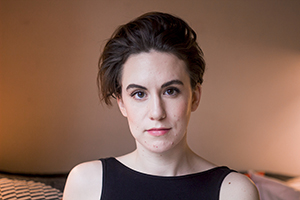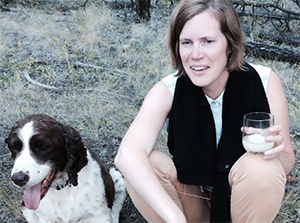Step Five of Twelve: Kate Kennedy
in Conversation with Gena Ellett

Malahat book reviewer Kate Kennedy talks with Gena Ellett, winner of the 2018 Charles Lillard Founders' Award for Creative Nonfiction for "Heaven," which appeared in Issue 199, Summer 2017.
Read what judge Andreas Schroeder had to say about Gena's winning memoir on the 2018 Founders' Award announcement page.
The first thing I was struck by when reading “Heaven” was your decision to use first person, to situate the piece as an address to the subject, your dad. I’m curious to know whether that was an immediate instinct, if you played with the narrative voice at all.
This piece began, more than anything, as a letter to my dad. I suppose I’d tried writing about our relationship before in different ways, but when it came down to it, the only way I could say what I wanted to say was in addressing it to him and pretending that no one else would ever read it. When you love an addict, there are so many things that you want to say, so many things you wish you could make them do/not do. But another part of loving someone with an addiction is realizing that absolutely nothing you say or do can change their behaviour. There is a lot of determination, faith, and hopelessness that go into that kind of relationship. You spend a lot of time imploring them to do things, a lot of time throwing your hands in the air.
Also—I suppose my address, in some ways, mirrors Step 5 in the Twelve Step Program—“admitted to God, ourselves, and another human being the exact nature of our wrongs”—something that my dad had delivered to me in the form of a letter in the past.
There is a lot of potential amid the themes of a father-daughter relationship and addiction to wander into a more maudlin telling and I was so impressed throughout “Heaven” with the line you walked between refusing to dodge the inherent drama of the facts themselves but also to trust them and not attempt to wring more out of them. Is plain (in the best sense of that word) language something you strove towards in this piece due to the subject matter or is it a wider preference of yours?
In general I am drawn to writing and writers that use concise, plain language. I feel like if you can say something in a few simple words instead of five intricate paragraphs, why not? It keeps the story at the forefront, and the reader from getting too weighted down in the language. There’s a time and place for everything, though!
There are some really beautiful moments in this essay in the way of contradictions (presence, lack of presence, for example), combined with the particular terminology surrounding addiction and recovery (clean/dirty) and then the images of the drowning man rescued and the mending of fishing nets. You have a gift, I think, for placing these elements alongside and trusting them to do what you need without overworking any of them. Can you say a little about how a piece develops for you in terms of finding the balance of storytelling, exploration of language, and more metaphoric imagery?
A lot of my stories start out with an image. For instance, with “Heaven,” I had the image of the fish eyeball and having asked my dad to cut it out of the fish for me. I kept getting caught on that image, and what it said about me and about our relationship. So I start there. I try not to get too caught up in my language or metaphor as I’m working on getting a first draft finished—you just have to try and get it all down on the page. Any considerations of how to put the pieces together, what kind of connections exist there in images and language, that all comes in the rewriting.
There’s a fair bit of discussion these days on where the line, if there is a line, ought to be drawn between fiction and non-fiction. I know you’ve written pieces presented as fiction and others as non-fiction. Is that a definition that feels fixed to you, shifting? Do you have content that finds its way into both?
I started as a fiction writer, and only found my way to nonfiction in the last few years. I grew up with the idea that nonfiction was a very rigid genre, with no room for beautiful language or the kind of fiction stories that I got totally lost in as a kid.
In my early twenties, I discovered Joan Didion and saw that there was a whole world of nonfiction that was beautiful and engaging in a way that I’d always associated with fiction. I do feel that the core of them is fixed in some ways, but that many elements of storytelling flow between the two of them. And then, of course, I do still struggle with whether I’m recalling something correctly, whether my recollection of the “truth” would match someone else’s.
Much of my fiction is based upon my own experience. There are just some stories that I can access through fiction more readily than I can through nonfiction. It can be a very vulnerable feeling, releasing writing into the world without the buffer of labeling it fiction.
Finally, a very standard last question, but one I always like learning the answer to: What are you working on these days, whether individual pieces or something book-shaped?
I’m working on a memoir collection called The Backroads that spans the years of my early twenties and explores the ideas of identity, grief, and loss. “Heaven” is one of the chapters, and I was so happy to see it published with the Malahat!

Kate Kennedy
* * * * * * * *









